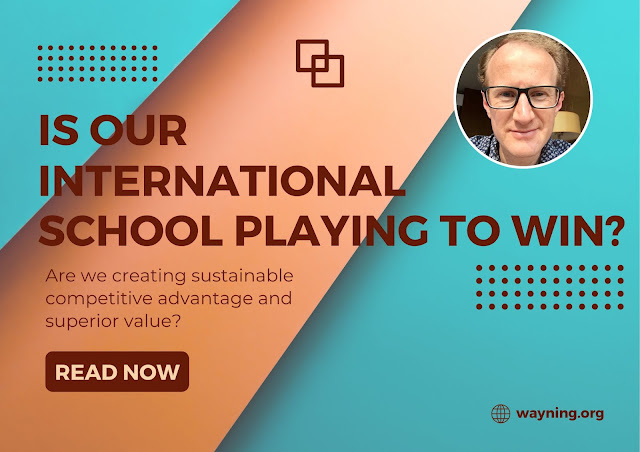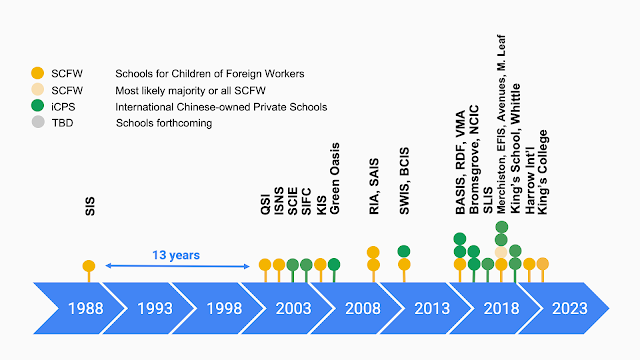The international school market is a highly competitive environment. Over the past 20 years, the number of international schools around the world has risen substantially. Each major city used to have one or two international schools. Today, some have more than 50 international schools. Singapore has over 90 international schools. International schools in these cities compete for a limited amount of school-age children. International schools also compete with local private schools and some public schools.
Take the city of Shenzhen in the Guangdong province of China. See chart below. In 1988, there was one international school in Shenzhen. Then it took 13 years for the next international school to open. Since 2001, 23 international schools and International Chinese-owned private schools have opened in Shenzhen. In 2001, SIS was only competing against one other international school. Today, each international school in Shenzhen is competing not only with many other international schools, but with a growing population of international Chinese owned private schools.
Research savvy parents search for the best school for their child.
As an international school, we can ask ourselves a number of questions. Winning is not everything, but. . .
- Are we paying to loose? No.
- Are we planning to win? Probably.
- If we are losing, do we go into panic mode? Maybe.
- Do we try to play catch-up? Maybe.
- Whether we are winning or losing, do we reflect on what is or just happened? Hopefully.
To survive, to win, to thrive, our school needs to create sustainable competitive advantage. “[An international school] has a competitive advantage when it implements a strategy that creates superior value for customers, and that its competitors are unable to duplicate, or find two costly to imitate.”*
So, are we as an international school creating sustainable competitive advantage?
How do we offer superior value?
- International baccalaureate continuum school?
- Teachers college affiliate school?
- One or more accreditations i.e. WASC, CIS, COBIS?
- State-of-the-art facilities?
- Most qualified and most experienced teachers in the city, receiving the best salary and benefit package in town?
- Best personalized professional development program?
- Most extensive co-curricular offerings in the region?
- What other things do you do to offer superior value?
- What other things could you do to offer superior value?
On our journey to create sustainable competitive advantage, we may develop temporary advantages. See graphic below. Temporary advantages stack up upon each other, slowly creating sustainable competitive advantage.
To win, we need a strategy. “Strategy is choices” and “we are the sum total of our choices.”+ Do we make choices in order to control events? Or do we allow events to control our choices? Do we take competitive action? Or do we respond to the competitive actions of others? In the past, what choices have we made to create competitive advantage and superior value? Today, what choices are we making? And in the future, what choices will we make? Write these choices down. Develop a strategic plan.
Where will you play? How will you win? If we are an international school in Dubai, we have decided to play in Dubai, the UAE, and the Middle East. Will there be only one winner in Dubai? Probably not. Other industries have multiple winners. For example, the mobile phone industry in China has three winners: Huawei, Oppo, and Vivo. The market for international schools contains different consumer groups, seeking different academic programs, and different value-added services.
The international school market is bound to have competitive rivalry.“ Become friends with your rivals.”~ Your rivals success can drive your success. What are our common identities? IB? British? American? Boarding school? Other? Schools who you have something in common. Build meaningful relationships with these schools. Your success, and vice versa, their success, will drive both of your futures.
Are we playing to win?
About Wayne and his why:
- Over 20 years of International school experience; principal in three schools in China.
- 2016 ‘aha moment’ - school leaders lack an understanding of the business principles, practices, and processes that impact their school and their daily decisions.
- Focus of doctoral coursework: Creating sustainable competitive advantage and superior value within the context of international schools.
- Focus of dissertation: Leadership styles, employee satisfaction, and the organizational performance of international schools in China and the United Arab Emirates.
References
~ Adam Grant, organizational psychologist.
* Hitt, M. A., Ireland, R. D., & Hoskisson, R. E. (2015). Strategic management: Competitiveness &
globalization: Concepts & cases(11th ed.). Stamford, CT: Cengage Learning.
+ Lafley, A. G., & Martin, R. (2013). Playing to win: How strategy really works. Quotefancy. (2019). Quotefancy-152097-3840x2160.jpg ["We are the sum total of our choices" -
Woody Allen]. Retrieved from https://quotefancy.com/quote/949760/Woody-Allen-We-Are-The-Sum-Total-Of-Our-Choices


